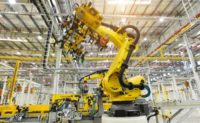SAVANNAH, GA—The burgeoning growth in U.S. auto exports may be coming in separate parts. The Wall Street Journal reports that U.S. automakers are exporting more cars this year, even as proposed tariffs on imported vehicles, and key materials such as steel and aluminum, are raising concerns over global supply chains.
Some American ports say they’re seeing even faster growth in partly assembled vehicles, however, a sign that manufacturers are resetting their factory and overseas distribution strategies to adjust to growing threats of tariffs.
At the Georgia ports of Savannah and Brunswick, which handle exports for several large manufacturing operations in the Southeast, auto exports are up 12 percent in the current fiscal year while auto-parts exports have risen 56 percent. Partly assembled cars, which are completed by workers in the destination country, are counted as auto parts.
“Clearly, auto parts is way up,” said Georgia Ports Authority executive director Griff Lynch, noting auto-parts tonnage at the Port of Savannah reached 101,212 tons during the nine months ending in March, up from 64,779 tons during the same period a year earlier.
For auto-handling ports, the strategy marks a shift since the partly assembled vehicles can’t be driven onto specialized ships known as car carriers. Instead, the cars generally are packed into containers and loaded onto container ships like other cargo.
Cars exported in partially assembled form, known as “knockdown” kits, are subject to different, often lower, levies than full cars. China recently said it would lower its tariff rate on auto imports to 15 percent from 25 percent, while lowering the rate for auto parts, a category that includes knockdown kits, to 6 percent from between 8 percent and 25 percent.
According to Commerce Department trade data, exports of motor vehicles and parts rose 3.3 percent to $30.5 billion in the first quarter of 2018 from $29.5 billion a year earlier.
Several auto-industry analysts said they don’t explicitly track exports of partially assembled kits, as it remains a smaller slice of the overall auto market. But the operation could grow as changes in tariffs lead manufacturers adjust their supply chains to new trade economics.






